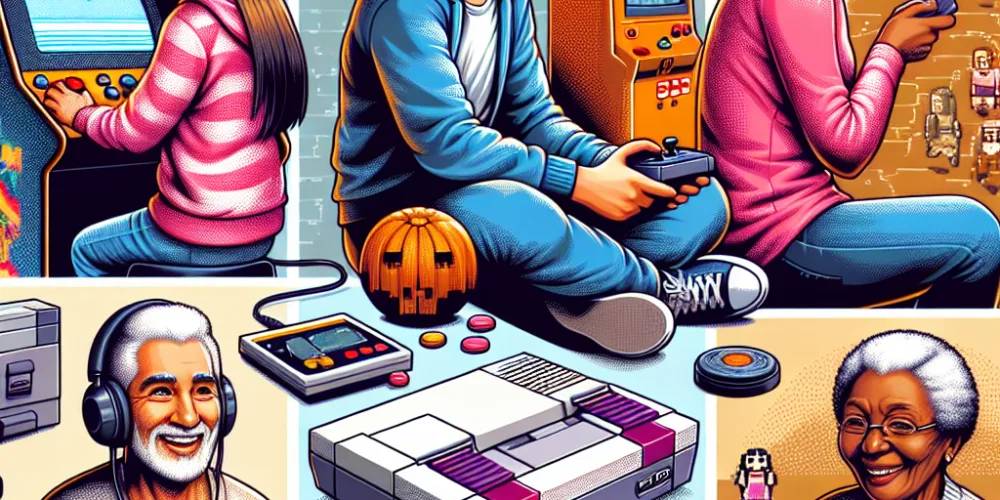In an era where cutting-edge graphics and virtual reality are dominating the gaming industry, a surprising trend is emerging: the resurgence of retro gaming. Classic video games from the 80s and 90s such as “Super Mario Bros,” “The Legend of Zelda,” and “Street Fighter” are attracting both nostalgic older players and curious new gamers. This renaissance is not just about playing games; it’s about celebrating a cultural era that shaped the modern digital landscape.
The appeal of retro gaming can largely be attributed to its simplicity and charm. Unlike contemporary games, which often require hours of dedication to master complex systems and narratives, classic games are straightforward and easy to engage with. This accessibility makes them particularly appealing in today’s fast-paced world, where many people are looking for forms of entertainment that are both uncomplicated and enjoyable.
The resurgence is also fueled by technological advancements that make these old games more accessible. Modern platforms like Nintendo’s Switch, Sony’s PlayStation, and various mobile devices now offer emulated versions of classic games, allowing new audiences to experience them on contemporary hardware. Additionally, the rise of online marketplaces has made it easier than ever for consumers to access retro games.
The cultural impact of these games has also played a significant role in their resurgence. Many of today’s game developers grew up playing these classics and are now integrating retro elements into new games. This blend of old and new ensures that the essence of retro gaming continues to influence the industry. Furthermore, the social aspect of retro gaming, with communities forming around shared experiences of these classic games, reinforces their relevance.
Events and conventions are also central to the trend, with gatherings like the Classic Gaming Expo and various Comic-Cons featuring retro gaming booths. These events offer fans a space to celebrate their favorite games and share their passion with like-minded individuals. The sense of community and shared nostalgia at these events is palpable, providing a stark contrast to the often solitary nature of modern gaming.
The market has responded enthusiastically to this growing trend. The success of products like the NES Classic Edition, a miniature version of Nintendo’s original console pre-loaded with classic games, underscores the demand. Released in November 2016, the console sold out quickly, and similar products have followed, including Sega’s Genesis Mini and Sony’s PlayStation Classic.
The impact of retro gaming extends beyond just playing games. It has influenced the aesthetics of various media, with television shows, movies, and music videos adopting an 8-bit graphic style that pays homage to the era. This style appeals not only to those who lived through the early days of video gaming but also to younger generations drawn to its vintage charm and simplicity.
In an educational context, these games are being used to teach programming and game design. Many contemporary game designers cite titles from the 80s and 90s as their initial inspiration, and educational institutions have noticed. Universities and even some high schools now use retro games to illustrate basic concepts in coding and digital creativity, recognizing that the simplistic yet challenging nature of these games provides a perfect training ground for the fundamentals of game design and logical thinking.
Moreover, the collectible market for vintage video game systems and cartridges has exploded. Collectors worldwide are seeking out rare games, turning what was once a casual hobby into a significant investment opportunity. This market has not only preserved many games that might otherwise have been forgotten but has also led to the establishment of museums dedicated to the history of video gaming.
In conclusion, the resurgence of retro gaming is more than a mere trend; it is a vibrant, multifaceted phenomenon that is impacting culture, technology, and business. It’s a manifestation of the timeless quality of good game design and a reminder of the roots of the digital age. As new generations discover these games, the legacy of retro gaming continues to expand, proving that sometimes, looking back is the best way to move forward.

David Farbacu is a seasoned writer with a passion for games, gaming, casinos, and Xbox. With a wealth of experience in the industry, David brings insightful reviews, comprehensive guides, and engaging articles that cater to both casual gamers and hardcore enthusiasts. His expertise spans across various gaming platforms and genres, making him a go-to source for the latest trends and developments in the gaming world.

